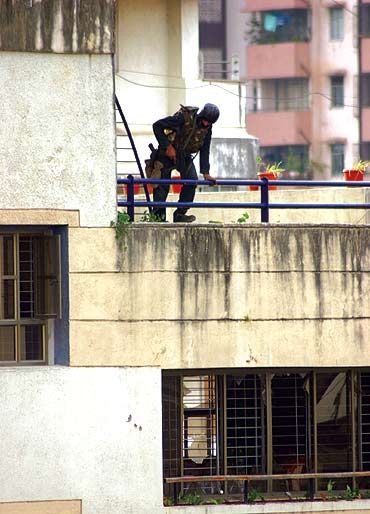When then ISI director Lieutenant General Ahmad Shuja Pasha visited Washington, DC for a meeting with CIA Director Michael Hayden, he admitted that the planners of the Mumbai attacks included some 'retired Pakistani officers' and that the attackers had 'ISI links, but this had not been an authorised ISI operation.'
Rediff.com's Aziz Haniffa reports from Washington, DC.
 Husain Haqqani, Pakistani ambassador to the United States from 2008 to 2011, says in his book Magnificent Delusions: Pakistan, the United States, and an Epic History of Misunderstanding that Deputy Secretary of State John Negroponte excluded all officials from a meeting with Pakistan's then national security advisor Major General Mahmud Durrani to address the national security advisor and Haqqani in private.
Husain Haqqani, Pakistani ambassador to the United States from 2008 to 2011, says in his book Magnificent Delusions: Pakistan, the United States, and an Epic History of Misunderstanding that Deputy Secretary of State John Negroponte excluded all officials from a meeting with Pakistan's then national security advisor Major General Mahmud Durrani to address the national security advisor and Haqqani in private.
'Although Negroponte was known as a friend of Pakistan,' Haqqani writes, 'on this occasion his language reflected a degree of agitation, which was something unusual for a diplomat of Negroponte's experience. "Why do we sense a degree of guilt in Pakistan's conduct?" he asked deliberately.'
Negroponte, Haqqani writes, wondered 'why Pakistan refused access to the LeT's planners it had arrested. Was it concerned that they might speak of their relations with the ISI?'
'It is time for Pakistan to come clean,' Haqqani recalls Negroponte as saying.
When Durrani said Pakistan's courts would determine the legality of requests for access, Haqqani remembers Negroponte had exploded, saying, "We know about Pakistan's courts. They order the hanging of elected prime ministers when the army asks them and don't look at legal niceties."
Haqqani says if Negroponte's tone at that meeting was agitated, then US secretary of state Condoleezza Rice's tone was downright angry: 'She began with the words, "I will not sugarcoat anything I say to you today",' Haqqani writes in his book.
He recalls Dr Rice telling Durrani and him "There is a serious problem with Pakistan" and that there was "clear evidence" in relation to the Mumbai attacks.
While acknowledging that there was "no direct link between the attackers and the Pakistan government," America's top diplomat had argued that "When people have been trained and intelligence operatives have relations with people who have been trained for such attacks, then there is a connection".'
Dr Rice, Haqqani notes, also said Pakistani should stop asking for proof and stop claiming that there is no proof: "This does not serve you. What you think and what the whole world thinks are two different things".'
'According to Rice,' Haqqani writes, 'Pakistan had all the information it needed to shut terrorist operations down forever. After all, the ISI knew who it had trained and equipped for terrorism.'
She had warned that Pakistan would be 'consumed' if it did not go after jihadi groups, Haqqani adds.
She also told Durrani that "focusing your energies on an Indian threat that does not exist is a colossal mistake," and that Pakistan had to "make a strategic decision that association with terrorists has to come to an end."
'It seemed that she felt the need to convey her strongly held views before she ended her tenure. She had been diplomatic with Pakistani officials for eight years, but now she wanted to get it out,' the book says.
Haqqani remembers that despite Durrani's claims that the Inter Service Intelligence's links with the LeT had been broken in 2002, Dr Rice had dismissed the denials, instead saying, "There is material support to the LeT and the LeT has just recently killed six Americans".'
'I sent a detailed account of the Rice-Durrani conversation to Islamabad,' Haqqani writes, and had remarked that 'as I have said in many telegrams since becoming ambassador, the view from Washington is very different from the way issues and matters are being perceived in Islamabad.'
Soon after Durrani's trip, the US shared intelligence with Pakistan proving the LeT's culpability, Haqqani's book says.
Subsequently, when then ISI director Lieutenant General Ahmad Shuja Pasha visited Washington, DC for a meeting with Central Intelligence Agency Director Michael Hayden, he admitted that the planners of the Mumbai attacks included some 'retired Pakistani officers' and that the attackers had 'ISI links, but this had not been an authorised ISI operation.'
Taking a swipe at General Pasha, Haqqani writes that when the ISI chief later came to tea at the Pakistan embassy, 'I took the opportunity to share with Pasha the names of ISI officers who had been egging on journalists back home to attack me as an American agent. He promised to "take care of the problem" just as he had 'promised Hayden to deal with the fallout of the Mumbai attacks.'
The CIA later received 'reliable intelligence' that the ISI was directly involved in the training for Mumbai attacks, Haqqani notes, and then Pakistan prime minister Yousaf Raza Gilani 'fired Durrani, possibly at the behest of some ISI officers, for publicly acknowledging (captured Mumbai attacker Ajmal) Kasab's Pakistani citizenship.'
'Thus, the government had lost one of its main interlocutors with the Americans,' Haqqani writes. 'The position of national security adviser was never filled again. This left discussion with the United States on counter-terrorism issues solely in the hands of the ISI.'
Image: A National Security Group commando during the Chabad House operation, November 28, 2008, day three of the Mumbai attacks. Photograph: Rajesh Karkera/Rediff.com









